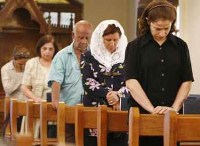Three people killed in attack on house that distributed Bibles in Turkey
Assailants killed three people at a publishing house that distributed Bibles, apparently targeting Turkey's small Christian minority.

The three victims were found with their throats slit and their hands and legs bound at the Zirve publishing house in Malatya, a city in eastern central Turkey, local Gov. Ibrahim Dasoz said. One was found still alive, and was taken to the hospital but later died, he said.
Two of the victims were Turkish, and one was a German who had lived in Malatya since 2003, Dasoz said. The German ambassador to Turkey said he was shocked by the attack.
"Even if the exact circumstances of the crime are not yet known, I most strongly condemn this brutal crime," Ambassador Eckart Cuntz said in a statement. The government-run Anatolia news agency identified the German as 46-year-old Tilman Ekkehart Geske.
A man who jumped from a window to escape was hospitalized with injuries and underwent surgery.
Police detained four suspects, and believe the man who jumped from the window was one of the attackers and leapt out to avoid arrest, according to the Malatya governor, Dasoz. Anatolia said all five suspects aged 19 and 20 were preparing for the university entrance exam and were friends from the same students' residence. They were all carrying a letter that read: "We five are brothers. We are going to our deaths. We may not return," according to Anatolia.
Malatya is known as a hotbed of nationalists, and is also the hometown of Mehmet Ali Agca, who shot Pope John Paul II in 1981.
The Zirve publishing house has been the site of previous protests by nationalists accusing it of proselytizing in this 99-percent Muslim but secular country, Dogan news agency reported.
Zirve's general manager told CNN-Turk that his employees had recently been threatened. "We know that they have been receiving some threats," Hamza Ozant said, but could not say who made the threats.
A group of 150 lit candles and unfolded a banner that read "We are all Christians" in downtown Istanbul to protest at the attack. Interior Minister Abdulkadir Aksu condemned the attack and said he viewed it as an assault on "peace, the environment of trust, stability and tolerance" in the country.
The manner in which the victims were bound suggested the attack could have been the work of a local Islamic militant group, commentators said, and CNN-Turk television reported that police were investigating the possible involvement of Turkish Hezbollah a Kurdish Islamic organization that aims to form a Muslim state in Turkey's Kurdish-dominated southeast.
Turkish Hezbollah which has been known to "hog-tie" its victims while torturing them takes its name from the Lebanon-based Hezbollah, but has no formal links to it. Turkish authorities recently said they were witnessing an increase in the group's activities.
Video footage broadcast on the private NTV news channel showed police tackling one man outside the publishing house, and rescue workers putting another man in a neck brace onto a stretcher.
Attacks have become more common against members of Turkey's Christian community, which comprises less than 1 percent of the population, and there have been concerns about rising nationalism and hostility toward non-Muslims.
In February 2006, a Turkish teenager shot a Catholic priest dead as he prayed in his church, and two other Catholic priests were attacked later that year. A November visit by Pope Benedict XVI was greeted by several nonviolent protests. Earlier this year, a suspected nationalist killed Armenian Christian editor Hrant Dink.
"These are fanatics who continue to be present in Turkey and who at a moment's notice emerge with these acts of absurd violence," Monsignor Luigi Padovese, the Vatican representative in Turkey, was quoted as saying by Italian news agency ANSA.
"Unfortunately the situation is very difficult and dangerous, but the Catholic Church continues to work as always," Padovese said. "However, (Turkish) authorities have the feeling that something very dangerous is moving in Turkey."
Constantinople modern-day Istanbul was the Christian Byzantine capital for more than 1,000 years until it fell to Muslim forces in 1453 and became the seat of the Muslim Ottoman Empire.
Of Turkey's 70 million people today, only about 65,000 are Armenian Orthodox Christians, 20,000 are Roman Catholic and 3,500 are Protestant mostly converts from Islam. Another 2,000 are Greek Orthodox Christians.
Subscribe to Pravda.Ru Telegram channel, Facebook, RSS!


